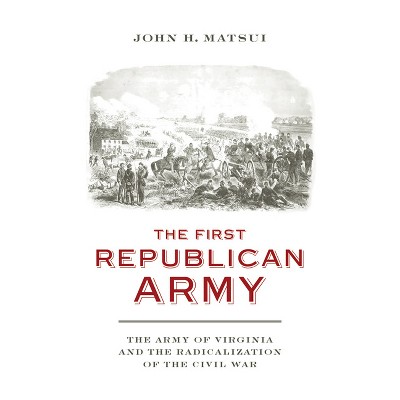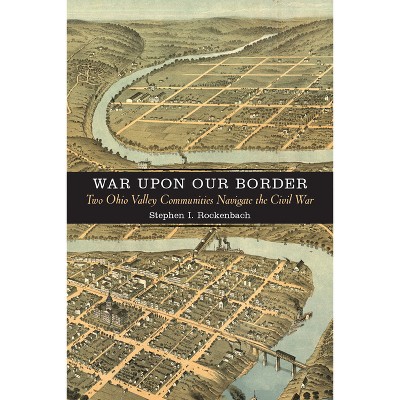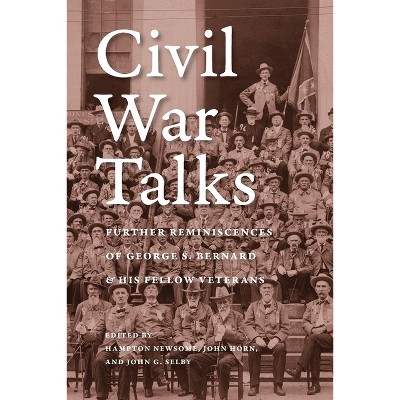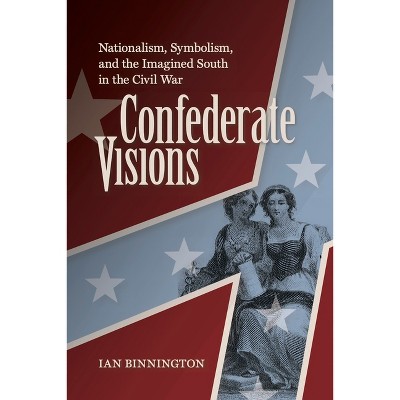Gold and Freedom - (Nation Divided) by Nicolas Barreyre (Paperback)

About this item
Highlights
- Historians have long treated Reconstruction primarily as a southern concern isolated from broader national political developments.
- About the Author: Nicolas Barreyre, Associate Professor at the École des hautes études en sciences sociales (EHESS) in Paris, is coeditor of Historians across Borders: Writing American History in a Global Age.
- 336 Pages
- History, United States
- Series Name: Nation Divided
Description
About the Book
A truly groundbreaking work, Gold and Freedom shows how much the fate of Reconstruction--and the political world it ultimately created--owed to northern sectional divisions, revealing important links between race and economy, as well as region and nation, not previously recognized.
Book Synopsis
Historians have long treated Reconstruction primarily as a southern concern isolated from broader national political developments. Yet at its core, Reconstruction was a battle for the legacy of the Civil War that would determine the political fate not only of the South but of the nation.
In Gold and Freedom, Nicolas Barreyre recovers the story of how economic issues became central to American politics after the war. The idea that a financial debate was as important for Reconstruction as emancipation may seem remarkable, but the war created economic issues that all Americans, not just southerners, had to grapple with, including a huge debt, an inconvertible paper currency, high taxation, and tariffs. Alongside the key issues of race and citizenship, the struggle with the new economic model and the type of society it created pervaded the entire country. Both were legacies of war. Both were fought over by the same citizens in a newly reunited nation. It was thus impossible for such closely related debates to proceed independently.
A truly groundbreaking work, Gold and Freedom shows how much the fate of Reconstruction--and the political world it ultimately created--owed to northern sectional divisions, revealing important links between race and economy, as well as region and nation, not previously recognized.
Review Quotes
Barreyre cleverly uses a growing and interesting area of historical research to richly contextualize and shed new light on the high politics of Reconstruction.
--Mr. Charles Thompson "Reviews in History "Gold and Freedom is an ambitious account of Southern Reconstruction after the Civil War interwoven with national currency and tariff policy.... American federal republicanism assumed the form of a dialectical relationship between national authority and coordinate state authority grounded in territorial sovereignty. Barreyre's account of sectionalism in terms of the "spatialization of politics" is helpful in understanding the course of Southern and national Reconstruction.
-- "Library of Law and Liberty"Gold and Freedom reflects an intimate knowledge of American party politics during a turbulent historical period.... [Barreyre's] account is nuanced and well-informed, drawing attention to intricate connections all too easily overlooked. As he argues: "...the study of Reconstruction, when viewed in a national context, must take into account political dynamics that might seem irrelevant to it if one were to focus solely on the racial question." Gold and Freedom amply confirms the truth of this statement.
-- "Civil War Book Review""Nicolas Barreyre's Gold and Freedom: The Political Economy of Reconstruction is a crucial and creative reinterpretation of politics and political culture of the U.S. in the era of Reconstruction. Over the course of Reconstruction, he argues, politics increasingly became an expression of sectionally based economic interests. His book forces historians to rethink the traditional story of nineteenth-century party realignment and the 'Retreat from Reconstruction.'... Perhaps the greatest achievement of the book is how Barreyre conveys the tremendous political instability and fluidity of the 1870s.... Barreyre's book is one of the most incisive and creative approaches to Reconstruction-era sectionalism, financial policy, and partisan politics to appear in many years."--American Historical Review
-- "American Historical Review"Barreyre's well-researched book, lucidly translated from the French by Arthur Goldhammer, illustrates the dynamics of sectional politics during the years after the Civil War. Barreyre's interpretation also suggests that Reconstruction was influential in shaping national economic policy and development well into the late nineteenth century. For these reasons, Gold and Freedom can be fruitfully read by students of Reconstruction, U.S. political economy, and congressional politics.
-- "North Carolina Historical Review"Drawing on congressional debates and voting patterns, politicians' papers, and newspapers, the book will delight readers who revel in politics and political intrigue.... At a time when Progressives' stock is rising, and with studies of political economy resurgent among historians, this provocative book should find the welcome audience it richly deserves.
-- "Journal of American History"Nicolas Barreyre's Gold and Freedom is the first serious attempt to analyze congressional policy making during the era of Reconstruction to appear in forty to fifty years. It is a brilliant piece of work. None of the previous studies of economic policy making have tied those disputes so integrally to the evolution of federal Reconstruction policy as Barreyre does here. The book will make a splash with students of the Civil War/Reconstruction period as well as with specialists.
--Michael Holt, Williams Professor of American History Emeritus, University of VirginiaNicolas Barreyre's Gold and Freedom: The Political Economy of Reconstruction is arguably the first full-length study of economic policy during Reconstruction to appear in fifty years.... Packed with insights, Gold and Freedom is a welcome addition to the historiography of Reconstruction.
-- "Journal of the Civil War Era"Thoroughly researched, Gold and Freedom brings the perspective of a gifted French historian to a perennial topic in U.S. history. By reinterpreting Reconstruction through a sectional lens, Barreyre shifts our attention from party conflict to what he calls its 'spatial dynamics.' It may well be that an outsider is best positioned to appreciate the enormous significance of sectionalism in U.S. national politics. Barreyre proves here that he definitely 'gets it.'
--Richard R. John, Columbia University, author of Network Nation: Inventing American TelecommunicationsWhat makes Barreyre's contribution so original is that he reads the narrative of Reconstruction against the background of a growing body of literature on the geography of capital in the 19th-century United States. In other words, he considers the relationship between two areas of historical research - party politics and economic geography - that are often only considered separately.... Barreyre cleverly uses a growing and interesting area of historical research to richly contextualise and shed new light on the high politics of Reconstruction. Combining economic geography and political history in this way really can be more than the sum of its parts.
-- "Reviews in History"About the Author
Nicolas Barreyre, Associate Professor at the École des hautes études en sciences sociales (EHESS) in Paris, is coeditor of Historians across Borders: Writing American History in a Global Age. Arthur Goldhammer, affiliated with the Center for European Studies at Harvard University, is translator of Alexis de Tocqueville and Gustave de Beaumont in America (Virginia), among numerous other works.











